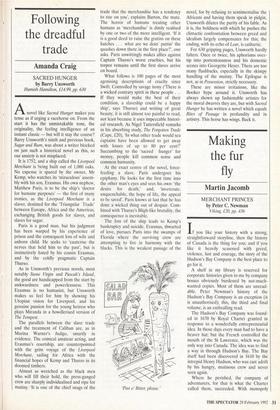Following the dreadful trade
Amanda Craig
SACRED HUNGER by Barry Unsworth Hamish Hamilton, f14.99, pp. 630 Anovel like Sacred Hunger makes you tense as if urging a racehorse on. From the start it has the unmistakable tone, the originality, the feeling intelligence of an instant classic — but will it stay the course? Barry Unsworth's ninth and previous book, Sugar and Rum, was about a writer blocked on just such a historical novel as this, so our anxiety is not misplaced.
It is 1752, and a ship called the Liverpool Merchant is being built out of 1,000 oaks.
No expense is spared by the owner, Mr Kemp, who watches its 'miraculous' assem- bly with his son, Erasmus. His own nephew, Matthew Paris, is to be the ship's 'doctor
for humane purposes' — the first of many ironies, as the Liverpool Merchant is a
slaver, destined for the 'Triangular Trade' between Europe, Africa and the Americas, exchanging British goods for slaves, and slaves for sugar.
Paris is a good man, but his judgment has been warped by his experience of prison and the consequent loss of wife and unborn child. He seeks to 'cauterise the nerves that held him to the past', but is instinctively hated by his cousin Erasmus, and by the coldly pragmatic Captain Thurso.
As in Unsworth's previous novels, most notably Stone Virgin and Pascali's Island,
the good are handicapped from the start by awkwardness and powerlessness. This Erasmus is no humanist, but Unsworth makes us feel for him by showing his Utopian vision for Liverpool, and his genuine passion for the young heiress who plays Miranda in a bowdlerised version of The Tempest.
The parallels between the slave trade and the treatment of Caliban are, as in
Marina Warner's Indigo, smartly in
evidence. The comical amateur acting, and Erasmus's courtship, are counterpointed
with the grim voyage of the Liverpool Merchant, sailing for Africa with the financial hopes of Kemp and Thurso in its doomed timbers.
Almost as wretched as the black men who will fill their hold, the press-ganged crew are sharply individualised and ripe for mutiny. 'It is one of the chief snags of the trade that the merchandise has a tendency to rise on you', explains Barton, the mate. The horror of humans treating other humans as 'merchandise' is dimly realised by one or two of the more intelligent. `If it is a good deed to raise the gratins on these hatches . . . what are we doin' puttin' the quashes down there in the first place?', one asks. Paris unwittingly makes allies against Captain Thurso's worst cruelties, but his torpor remains until the first slaves arrive on board.
What follows is 100 pages of the most agonising descriptions of cruelty since Swift. Controlled by savage irony (There is a wicked contrary spirit in these people . . If they would make the best of their condition, a slaveship could be a happy ship', says Thurso) and writing of great beauty, it is still almost too painful to read, not least because it uses impeccable histori- cal research. As Nigel Tattersfield remarks in his absorbing study, The Forgotten Trade (Cape, L20), 'In what other trade would sea captains have been allowed to get away with losses of up to 80 per cent?' Succumbing to the 'sacred hunger' for money, people kill common sense and common humanity.
At the exact centre of the novel, force- feeding a slave, Paris undergoes his epiphany. He looks for the first time into the other man's eyes and sees his own: 'the desire for death,' and, 'inveterate, unquenchable, the hope of life, the appeal to be saved'. Paris knows at last that he has done a wicked thing out of despair. Com- bined with Thurso's Bligh-like brutality, the consequence is inevitable.
The loss of the ship leads to Kemp's bankruptcy and suicide. Erasmus, thwarted of love, pursues Paris into the swamps of Florida where the surviving crew are attempting to live in harmony with the blacks. This is the weakest passage of the 'Pint o' Bitter, please.'
novel, for by refusing to sentimentalise the Africans and having them speak in pidgin, Unsworth dilutes the purity of his fable. As it is, the boldness with which he pushes the climactic confrontation between greed and idealism largely compensates for this; the ending, with its echo of Lear, is cathartic.
For 630 gripping pages, Unsworth hardly falters. Once or twice, his aphorisms over- tip into portentousness and his domestic scenes into Georgette Heyer. There are too many flashbacks, especially in the skimpy handling of the mutiny. The Epilogue is not, as in Possession, strictly necessary.
These are minor irritations, like the Booker hype around it. Unsworth has always shown up fashionable artistes for the moral dwarves they are, but with Sacred Hunger he has written a novel which equals Rites of Passage in profundity and in artistry. This horse has wings. Back it.


















































 Previous page
Previous page